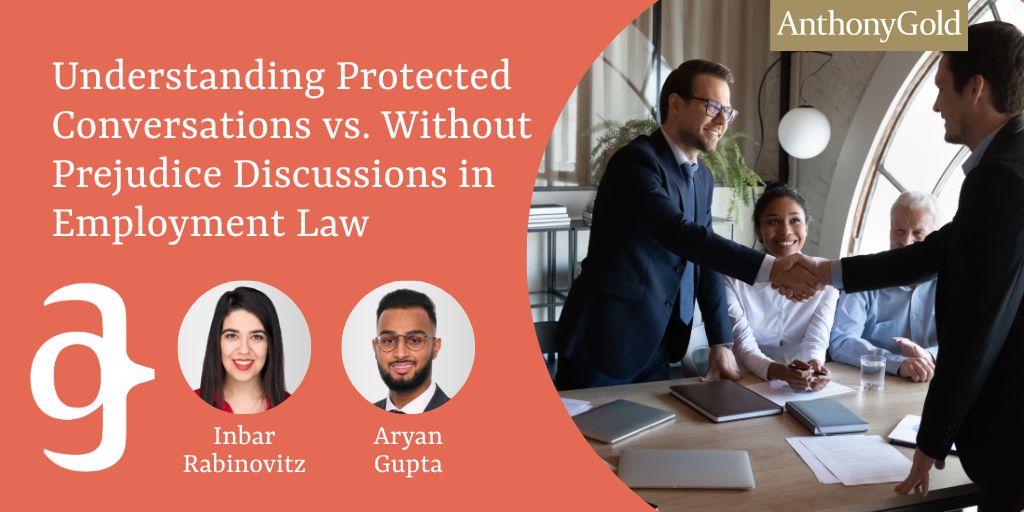Understanding Protected Conversations vs. Without Prejudice Discussions in Employment Law

In the often-sensitive context of workplace disputes and employment terminations, clear communication between employer and employee is crucial. However, such discussions may carry legal implications if not handled correctly. Two commonly used legal mechanisms —Protected Conversations and Without Prejudice communications — offer confidentiality to facilitate candid settlement discussions. But what exactly are the differences between them, and when should employers opt for one over the other?
This blog will explore the key distinctions between protected conversations and without prejudice communications, helping you make informed decisions when navigating settlement agreements and employment disputes.
What is a Protected Conversation?
A Protected Conversation is a type of confidential discussion introduced under Section 111A of the Employment Rights Act 1996. It allows employers and employees to have open and “off the record” conversations about potential exits or settlements without fear that the details will later be used against them in an unfair dismissal claim or formal internal processes. When should one use a Protected Conversation?
Employers may initiate a protected conversation when they want to broach the topic of an employee leaving, typically with an accompanying settlement offer. There is no need for an existing dispute, making it an ideal method for situations where the employer wishes to negotiate an exit without implying wrongdoing or animosity.
It’s important to note that while these discussions are protected from being used as evidence in unfair dismissal claims, they do not cover other types of claims, such as discrimination or whistleblowing.
What is a Without Prejudice Conversation?
A Without Prejudice conversation is another mechanism used to protect the confidentiality of discussions between an employer and employee. However, unlike protected conversations, without prejudice communications are only available when there is a genuine, existing dispute between the parties.
Without prejudice conversations are intended to encourage the resolution of disputes by allowing the parties to speak freely during settlement negotiations. Anything discussed in a without prejudice meeting is typically inadmissible in court or tribunal proceedings, so long as the discussions are genuinely aimed at resolving the dispute.
When should one use Without Prejudice Conversation?
Without Prejudice conversations should be used when there is a clear, pre-existing legal dispute between the employer and the employee. For example, if the employee has already raised a formal grievance or if legal claims are being discussed, any settlement negotiations should be conducted on a without prejudice basis to ensure that offers or concessions cannot later be used as evidence in court.
When Should Employers Opt for a Protected Conversation?
Protected conversations are particularly useful when an employer wishes to discuss a potential settlement or termination with an employee, but without any formal dispute in place. For instance, if an employer anticipates a performance issue or redundancy situation, they may want to broach the subject of an employee’s exit in a way that remains confidential and cannot be later used as evidence in an unfair dismissal claim.
When Should Employers Use Without Prejudice Conversations?
Without prejudice conversations can only be used when there is already a legal dispute between the employer and employee so these conversations should be used when both parties are actively trying to resolve a disagreement or potential claim.
For example, if an employee has lodged a formal grievance or has raised a complaint related to unfair treatment, a without prejudice conversation may be appropriate to explore settlement options. This protection ensures that the employer’s settlement offers or any admissions made during the conversation cannot be used against them in future tribunal or court proceedings.
Key Differences Between Protected Conversations and Without Prejudice Discussions
While both mechanisms offer confidentiality, there are significant differences between protected conversations and without prejudice discussions. Understanding these distinctions is critical to ensuring that the correct type of conversation is used in the right context.
| Aspect | Protected Conversations | Without Prejudice Conversations |
| Existence of a Dispute | No dispute necessary — can be initiated at any time. | Requires an existing legal dispute between the parties. |
| Legal Protections | Limited to unfair dismissal claims only. | Can apply to a broader range of disputes, such as discrimination or breach of contract. |
| Admissibility in Court | Inadmissible in unfair dismissal claims but may be used in other types of cases like discrimination or whistleblowing. | Inadmissible if part of a genuine attempt to resolve an ongoing dispute. |
| Initiation | Employer can initiate without the need for a pre-existing dispute. | Usually initiated when a formal dispute or grievance has already arisen. |
Potential Pitfalls and Misuse of These Conversations
While both protected and without prejudice conversations can offer essential confidentiality protections, there are potential risks and limitations associated with their misuse.
Protected Conversations
- Limited to Unfair Dismissal: As mentioned earlier, protected conversations only apply to unfair dismissal claims. If an employee brings other types of claims, such as those relating to discrimination or whistleblowing, the employer cannot rely on the protection of Section 111A to keep the conversation confidential.
- Improper Behaviour: Protected conversations are not immune to claims of improper behaviour. If an employee alleges discrimination, harassment, or victimisation during these discussions, the protection may be lost. In such cases, the conversation could be admitted as evidence in these claims.
- Without Prejudice Conversations
- Genuine Dispute Requirement: As mentioned previously, without prejudice protection only applies when there is a clear legal dispute. If the conversation is not genuinely aimed at resolving that dispute, any statements made could be admissible in court.
- Improper Labelling: Simply marking a conversation as “without prejudice” does not guarantee protection. If the underlying purpose is not a bona fide settlement discussion, the court or tribunal may disregard the label and admit the content as evidence.
Employers must carefully consider the circumstances before using either protected or without prejudice discussions to avoid these pitfalls.
How to Effectively Handle Settlement Negotiations
For employers, effectively managing settlement discussions, whether under protected or without prejudice, requires careful planning and adherence to best practices. Here are a few key tips to ensure a successful negotiation process:
- Understand the Legal Framework: Ensure you are aware of the specific protections and limitations of both protected conversations and without prejudice discussions. This helps in choosing the appropriate method depending on the nature of the employment issue.
- Document the Process: Keep detailed records of any meetings or discussions held as part of the negotiation process. This can help protect the employer if a claim arises later, even if the contents of the conversation are inadmissible.
- Maintain Professional Conduct: Always ensure that conversations remain professional and that no inappropriate behaviour occurs. This will help avoid situations where the protection could be lost due to allegations of discrimination or misconduct.
- Seek Legal Advice: Given the complexity of employment law, employers should seek legal advice when negotiating settlement agreements. An employment lawyer can help you navigate the nuances of protected and without prejudice conversations, ensuring compliance with legal requirements.
By following these steps, employers can increase the likelihood of successful settlement discussions while minimising legal risks.
Conclusion
Understanding the difference between protected conversations and without prejudice discussions is essential for employers who are looking to manage sensitive employment issues, negotiate settlement agreements, or resolve disputes.
While both mechanisms provide valuable protections, they must be used in the appropriate context to be effective. Protected conversations are ideal when initiating discussions about potential exits or settlements before a formal dispute arises. On the other hand, without prejudice conversations are more appropriate when an existing legal dispute needs to be resolved through confidential negotiations.
Employers should exercise caution when conducting these discussions, ensuring they understand the limitations and risks of each type of conversation. When in doubt, seeking legal advice is always a prudent step.
For more information or to schedule a consultation, please contact our team of experts on 020 7940 4060 or email us at mail@anthonygold.co.uk.
* Disclaimer: The information on the Anthony Gold website is for general information only and reflects the position at the date of publication. It does not constitute legal advice and should not be treated as such. It is provided without any representations or warranties, express or implied.*

No comments